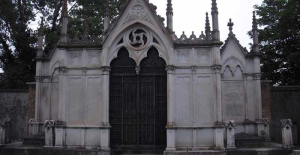
-
 History of Religions
History of the 3 Monotheistic religions (Judaism, Christianity and Islam) and of the main different Christianity confessions (Roman Catholicism, Eastern Catholicism and Eastern Orthodoxy, Anglicanism and Protestantism)
History of Religions
History of the 3 Monotheistic religions (Judaism, Christianity and Islam) and of the main different Christianity confessions (Roman Catholicism, Eastern Catholicism and Eastern Orthodoxy, Anglicanism and Protestantism)
-
 Pedagogical Approaches
New pedagogical approaches to teach history of religion
Pedagogical Approaches
New pedagogical approaches to teach history of religion
-
 Role of Religions in Civilization
How to didactically promote among students of different confessions, the capacity of a critical analysis and understanding of the role played by religions in the history of mankind
Role of Religions in Civilization
How to didactically promote among students of different confessions, the capacity of a critical analysis and understanding of the role played by religions in the history of mankind
-
 Interreligious Students’ Competences
Set of teaching contents, to be used by teachers to highlight and valorize the universal values of tolerance and universalisms that all Monotheistic religions and religious texts contain to promote and sustain mutual understanding among students
Interreligious Students’ Competences
Set of teaching contents, to be used by teachers to highlight and valorize the universal values of tolerance and universalisms that all Monotheistic religions and religious texts contain to promote and sustain mutual understanding among students
-
 Managing Multi-Religious Classes
Teaching Sources to help teachers dealing with multicultural and multi-religious classes
Managing Multi-Religious Classes
Teaching Sources to help teachers dealing with multicultural and multi-religious classes
-
 Introduction
A comparative review of the liturgical celebrations, ceremonies and dietary rules existing in the different religions.
Introduction
A comparative review of the liturgical celebrations, ceremonies and dietary rules existing in the different religions.
-
 Celebrations
Description and comparative analysis of the celebrations of different religions and confessions
Celebrations
Description and comparative analysis of the celebrations of different religions and confessions
-
 Ceremonies
Description and comparative analysis of the ceremonies of different religions and confessions
Ceremonies
Description and comparative analysis of the ceremonies of different religions and confessions
-
 Dietary Rules
Description and comparative analysis of the dietary rules of different religions and confessions
Dietary Rules
Description and comparative analysis of the dietary rules of different religions and confessions
Events
The Pathway through Religions project has been promoted trough conferences and articles.
Partnership
-
 Contractual Partners
From this section it is possible to access to a description of each contractual partner of the Pathway through Religions project.
Contractual Partners
From this section it is possible to access to a description of each contractual partner of the Pathway through Religions project.
-
 Schools
From this section it is possible to access to the information about the schools involved in the Pathway through Religions Project in the European countries involved.
Schools
From this section it is possible to access to the information about the schools involved in the Pathway through Religions Project in the European countries involved.
-
 Associated Partners
As a result of the exploitation activity a number of associated partners officially joined the project in order to contribute to the improvement of the project impact on their target groups and to ensure the project sustainability by continuing using the project deliverables in the next years.
Associated Partners
As a result of the exploitation activity a number of associated partners officially joined the project in order to contribute to the improvement of the project impact on their target groups and to ensure the project sustainability by continuing using the project deliverables in the next years.
This section of the Pathway through Religions portal provides administrative information for the project contractual partners and for the European Commission and it is password protected.
Map
Homepage > ReligiousSite Map > Map

An interactive didactical map interactive didactical map giving access to sites with a religious relevance.
Back to the Religious Sites List

Museum of Jewish culture - Jewish cemetery
Museum of Jewish culture - Jewish cemetery Acqui Terme – via Salvadori
DESCRIPTION OF THE RELIGIOUS SITE
with the guide of the students of the section of the Tourist Technical Institute.
Classroom activity (pre and post the visit):
Analysis of some of the gravestones in the cemetery Presentation of the figure of Raffaele OttolenghiActivity of verification of the acquired knowledge
Argenti's Synagogue - 44, Vicolo Salomone Olper, - Casale Monferrato (Alessandria) ITALY
Cathedral of Santa Maria Assunta of Acqui Terme - Duomo Square - 15011 ACQUI TERME (Alessandria) - Italy
Jewish Museum of Rome - Via Catalana, Rome
- Building Students’ Interreligious Competences in Communication and Adaptation in a Cross-Cultural Environment - Interfaith Map of the Local Community
- Building Students’ Interreligious Competences in Communication and Adaptation in a Cross-Cultural Environment - Recognizing and Developing the Positive Potential
- Building Students’ Interreligious Competences in Communication and Adaptation in a Cross-Cultural Environment - Making Judgements – The Role of Religion and Cultural Traditions
MEDIA RESOURCES
LINKS
- Jewish Community Union
-
L'Ancora
Sites respectively of the Municipality of Acqui and the diocesan weekly "L'Ancora" on which the initiatives related to the site are presented
-
Sito Comune Acqui Terme
Sito Comune Acqui Terme
